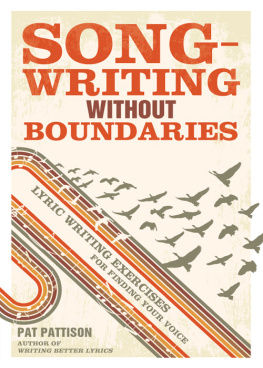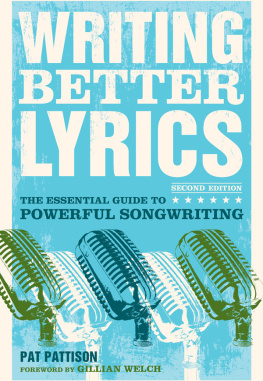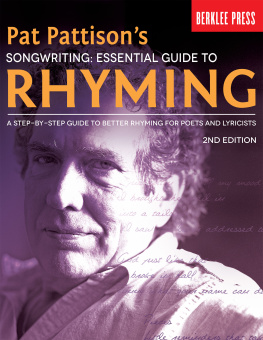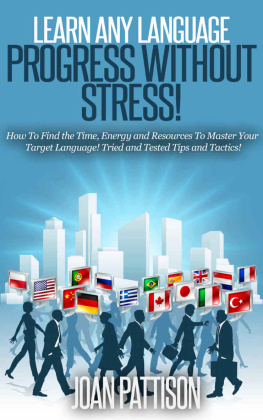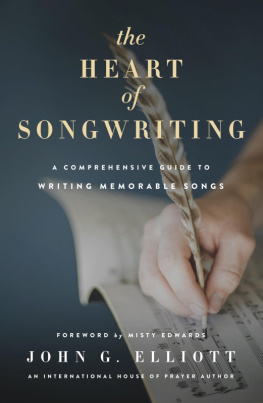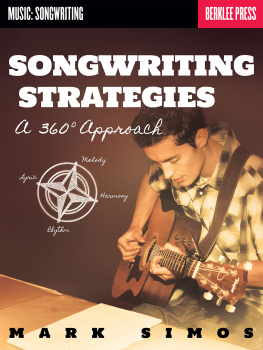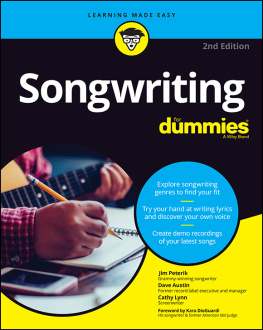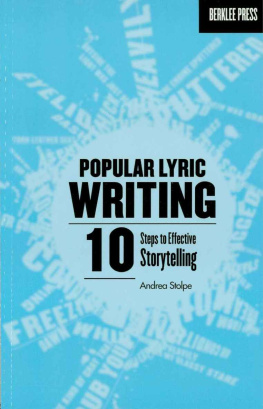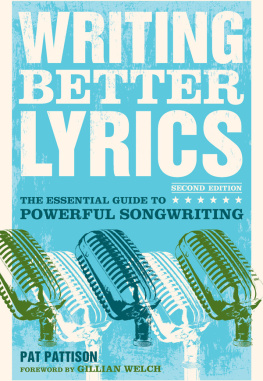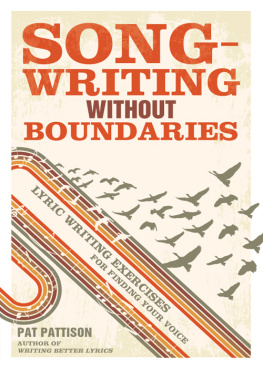SONGWRITING
WITHOUT
BOUNDARIES
LYRIC WRITING EXERCISES
FOR FINDING YOUR VOICE
PAT PATTISON
AUTHOR OF WRITING BETTER LYRICS

ABOUT THE AUTHOR
Pat Pattison is a professor at Berklee College of Music, where he teaches lyric writing and poetry. His books Writing Better Lyrics , The Essential Guide to Lyric Form and Structure , and The Essential Guide to Rhyming are considered definitive in their genre and have earned many ecstatic reviews. In addition, Pat has developed four lyric writing courses for Berklees online school, available through patpattison.com, and has written more than thirty articles for a variety of industry publications. His internationally successful students include multiple Grammy winners John Mayer and Gillian Welch. He continues to present songwriting clinics across the globe.
Pats website is: http://patpattison.com.
THANK YOU
My deepest gratitude to the many writers who participated in these challenges. Youve set a high bar, and your work will both instruct and inspire. Youve marked out an enchanting path for writers to follow, and as they do these challenges, they surely will fall in love with your writing. I did.
To my many students. Your passion, curiosity, and creativity continue to embiggen me on a daily basis.
To the songwriters, artists, and industry professionals who participate in my annual student Spring Break Trip to Nashville. Your generosity over the last two and a half decades has transformed so many lives.
To my colleagues at Berklee College of Music. Your drive to find a stronger, clearer way to say it continues to enlighten me.
To Mike. You write a mean foreword, buddy.
To Jason, Suzanne, Maia, Olivia, and Holly, just for being you.
To my wife, Clare. You make everything better.
FOREWORD
I dont like forewords, afterwords, prefaces, authors notes, or introductions in books. But Pats been a friend for a long time and against all common sense, he asked me to do this. I could say no only so many times.
Not long ago I said to Pat, Why bother with all this when great lyrics dont seem to matter anymore? They matter to you, dont they? he shot back. And there it was. For reasons beyond my full understanding I had to confess that they did matter to me. A lot. If they matter to you, buy this book. It wont tell you what you should write about. Getting off the couch and out into your own life will do that. What it will do is teach you how to write. Best of all, it will teach you how to think like a writer.
Talent is a mystery, a gift, a discovery of oneself. Technique, on the other hand, is just plain hard work and for me, the single greatest challenge of writing well has always been in understanding what I mean to say. Its not what others think you should be saying, but what you and you alone mean to say.
How, then, do we break through the barriers of the well-ordered conscious mind and get to where the honest impulses, the richest ideas, the deepest passions live? Waiting on the muse to ascend is a fools errand. If youre of a mind to want to get at the best in you, you hold in your hands, at this moment, a tool of inestimable value. Mark Twain said, The difference between the right word and the almost right word is the difference between lightning and the lightning bug. Faithfully following the principles set down in this book will not only help you nd the right word but, more importantly, will be a constant companion in the lifelong journey toward understanding precisely what it is you mean to say.
Over the years, Pat and I have disagreed more than a little on many things. But I take no issue with his deep, abiding desire to help those who choose to write, write better.
Mike Reid
Nashville, TN
July 2011

INTRODUCTION
For us, there is only the trying.
The rest is not our business.
T.S. ELIOT (EAST COKER, FROM THE FOUR QUARTETS)
This is a book on writing. And it is a book for writing. For writers of all kinds: songwriters, poets, playwrights, novelists, bloggers; anyone who loves the taste of words. It challenges you to take a journey into yourself to discover not only what you have to say, but also to discover an authentic voice to say it with.
Finding your voice as a writer is a lot like finding your voice as a singer. If you can carry a tune, you can learn to do it better. You can find, by exploration, where your voice feels strongest, where it feels the most like you. You try different styles, different timbres, different approaches and, slowly for some, more quickly for others, the real you emerges. The feeling you get when you hit that bulls-eye is like no other feeling. Youre incredibly alive and centered, like youve pushed your roots deep into the earths core. But committing to a journey to find that unique voice takes work; it takes practice.
Even if you have massive talent, you can learn to do it better, and with more consistency. Great singers use vocal coaches. Even in their prime, they continue the search.
Writing is like that, too. You have a writing voice, something that feels the most like you. Your job is to find it.
This book will help you find your writing voice. It will help you do the work it takes. And, it will help you practice.
I got the idea for this book from observing how effectively 14-day challenges focused and improved my students writing. 14 days is short enough to be manageable, but long enough that it stretches you, forces you to come up with ideas, to just write about something , rather than be paralyzed by needing to find that great idea. In my experience, great ideas are more likely to present themselves while youre writing than while youre not. The 14-day challenge took the fear out of my students writing and put the fun back in. It can do that for you, too.
I decided to set four 14-day challenges to help you explore your writers voice more fully. Each challenge asks you to concentrate on a different facet of your writer, to explore, not only how you think , but the stuff of your senses , then to relate those senses to the outer world, transforming them into metaphor.
The first 14-day challenge, Object Writing, asks you to respond to three prompts each day, of 10 minutes, 5 minutes, and 90 seconds. It will help you be more vivid and specific in your writing, and the timed writing will help your speed and efficiency.
The second challenge is on metaphor. It asks you to use your newfound skill at sense-bound writing in a step-by-step process for finding metaphors. By the time you finish, you should be a pro. This challenge also contains timed writing to help you chop away the underbrush in your writing faster.
Then challenge 3 asks you to extend metaphors, learn to explore them deeply, and see them from reversed directions: both a pack of hungry wolves is a hurricane, and also a hurricane is a pack of hungry wolves. Youll write a 5 or 10 minute response to each prompt, mostly four pieces each day.
The final challenge asks you to do it all in rhythm and rhyme. Again, because the writing is timed, it forces you to go deep, quick. It teaches you to think ahead rhythmically and manipulate rhyme more fluidly.
If you do all these challenges, I suggest you take a short time between them to let the swelling subside a bit. I also strongly suggest that you find a friend or friends to do the challenges, someone to share your work with. That way, youre responsible to someone and theyre responsible to you. Youll both have an audience and a cheerleader. Its pretty neat.
Next page
